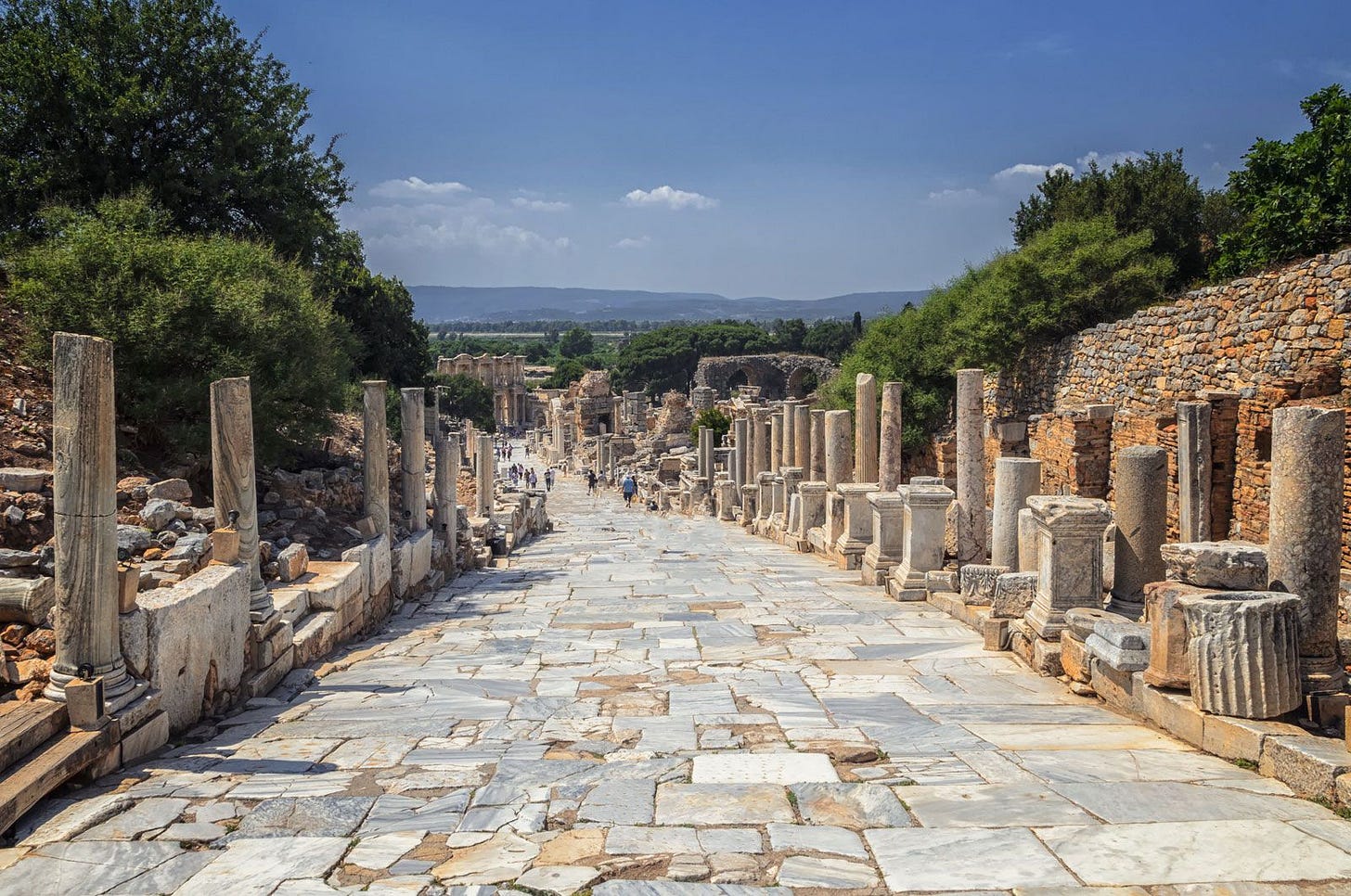While Apollos was at Corinth, Paul took the road through the interior and arrived at Ephesus. There he found some disciples and asked them, “Did you receive the Holy Spirit when you believed?” They answered, “No, we have not even heard that there is a Holy Spirit.” (Acts 19.1-2)
To the angel of the church in Ephesus write:
These are the words of him who holds the seven stars in his right hand and walks among the seven golden lampstands. I know your deeds, your hard work and your perseverance. I know that you cannot tolerate wicked people, that you have tested those who claim to be apostles but are not, and have found them false. You have persevered and have endured hardships for my name, and have not grown weary…And you have this in your favor: You hate the practices of the Nicolaitans, which I also hate. (Revelation 2.1-3, 6)
When I was a lad, I lived in a village of 2,004 people with a huge lot of Christian churches per capita. If memory serves, we had at least a Nazarene, Assembly of God, United Methodist, Christian Church, Catholic, Missouri Synod Lutheran, Mennonite, three small(er) non-denominational churches, and a Christian ministry to youth called Young Life. (It doesn't count as Christian, but there was also a mysterious Church of Scientology on the hill above town.)
I don't know about other people, but I darkened the door of each of the churches I've named here at one time or another. My family's home church was the United Methodist, I became a person of faith through Young Life, attended a great Bible study in the Christian church, worshiped a few times in the three non-denominational spots, went with friends to the Nazarene, the Lutheran, and the Catholic churches (Midnight Mass at Christmas), sang in a Christian youth concert in the very Pentecostal Assembly of God church, and went to Vacation Bible School with the Mennonites. (If we wanted to slum with the Presbyterians or Episcopalians, we drove ten miles to McMinnville, and I did that, too.) In other words, at some level the churches opened their doors to one another.
On the other hand, there were differences and boundaries. The Lutherans used wine for communion, which shocked my system the first time (so much heat going down!) because we Methodists drank grape juice. I was perplexed not to be permitted to take communion — just cross my arms and wait — in the Catholic church. The Assemblies people spoke in tongues and generally had more people talking and singing at once than the others. The Mennonite women wore a net on the top of their heads and their men dressed soberly. Our Young Life group sang contemporary songs but most everyone else had organs or pianos and sang traditional hymns. I'm sure that some of us thought others weren't going to heaven, too. Maybe you also came from or live now in a city or town with this sort of variety.
This way of being different near one another is not new. Ancient cities around the Mediterranean Sea began having several kinds of churches very early. Tonight I'll start leading an online national Bible Study that explores the strange mix of Christian groups in the great ancient city of Ephesus -- starting as early as two decades after Jesus' death and resurrection. Here's a quick list of groups we can place in Ephesus from A.D. 50-100.
John the Baptist’s Group
Paul the Apostle’s Group
Timothy and Other Pauline Leaders
John the Apostle’s Group + Opponents
John the Revelator’s Group
The “Nicolaitans” — John the Revelator’s Christian Opponents
As you can guess, with my childhood experience I'm very curious to know how these groups related to one another. Did they ever meet together? Host a collaborative Vacation Bible School? How did they see one another? Did they have singalongs together? See one another as rivals? Both? Neither?
My point is that we've come by this multi-form way of doing Christianity honestly. We inherited it from the earliest churches who lived side by side in ancient cities. Sometimes we collaborate. Sometimes we fight. Most of the time it's somewhere between the two. “One body, with many members”, said Paul about the living room-sized groups he started in city after city. But what Paul says about individual Christians, we could properly about churches -- that the variety of Christian groups are many members of the larger body of Christ across town, each of which may be good at something toward a shared, “common good”.
I wonder. Because if we look at Christ's church this way, then each church may bring a different gift -- a different inroad to Jesus. It's worth a think, right? And if it's worth a think, it may even be worth a try. If we did try to see the value in each other's churches, we might just find ourselves bein' Ephesian.
What do you think is your home church’s primary gift? And what about the church down the street?
Put on some new lenses on this May Thursday, friend, and look around for God’s gifted churches. You’ll be surprised how it changes perspective to look for the good.
Prayer -- God, you run a BIG operation, and you gift us to be good at it with one another. Help us with that these days, in Jesus. Amen.




